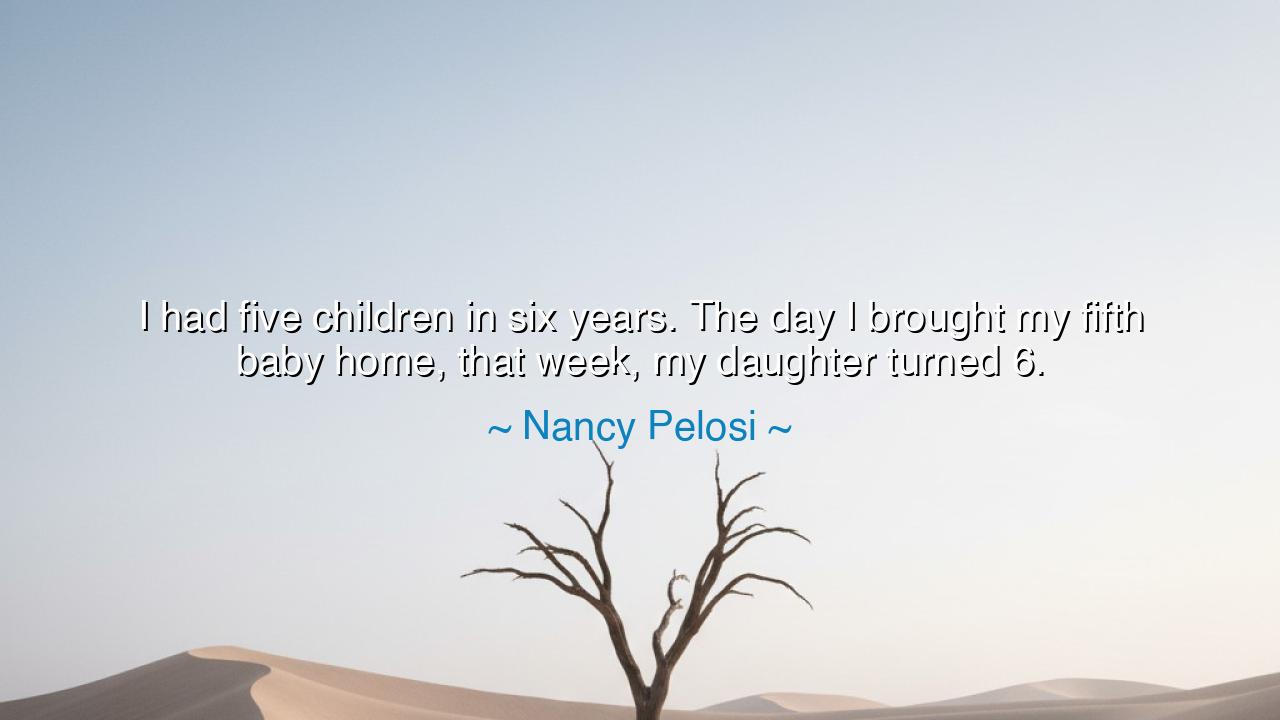
I had five children in six years. The day I brought my fifth baby
I had five children in six years. The day I brought my fifth baby home, that week, my daughter turned 6.






When Nancy Pelosi said, “I had five children in six years. The day I brought my fifth baby home, that week, my daughter turned 6,” she was not merely recounting a fact of motherhood — she was revealing a testament to endurance, sacrifice, and strength. In those few words lies the epic rhythm of a life lived in service, first to family, and later to country. It is a statement both humble and profound, for it captures the quiet heroism of those who bear the weight of creation — not through conquest or ambition, but through the nurturing of life itself. Her words are not complaint, nor boast, but reflection — the voice of one who has walked the long road of responsibility and found meaning in its every step.
Pelosi’s remark, simple on its surface, speaks to a truth the ancients knew well: that the work of raising souls is among the greatest labors of humankind. To bring forth life and shape it, to guide not one but five children through the fragile years of growth, is to live in constant motion — a life of sleepless nights, of noise and need, of self set aside for the sake of others. And yet, within that storm, there is a strange and enduring peace — the peace of purpose. The ancient Greeks honored not only warriors and statesmen, but mothers, who were seen as the hidden architects of civilization. For they knew that from their patience came the leaders and thinkers who shaped the destiny of nations.
In Pelosi’s words, we hear the sound of both chaos and creation. Imagine a household of five children, all under the age of six — the laughter, the tears, the boundless energy of youth. It is a symphony of life at its fullest — demanding, relentless, beautiful. And yet, from this crucible, Pelosi emerged not diminished, but forged in strength. Her later career in politics, her calm amid storms of partisanship and power, seems to reflect the discipline and patience honed in those early years. For if one can keep peace among five children, one can surely hold one’s ground in the halls of government. Her story reminds us that leadership often begins in the home — in the daily trials that teach resilience, compassion, and courage.
The ancients would have called such a woman stoic — not in the sense of coldness, but of unshakable purpose. The philosopher Marcus Aurelius wrote that the strongest soul is one that moves through difficulty as the flame through wind — bending, but never extinguished. Pelosi’s early motherhood, marked by exhaustion and devotion, mirrors that same flame. Each child represented both a gift and a demand, and through them she learned the art of balance — the eternal dance between giving and enduring. In her reflection, there is no self-pity, only acknowledgment of the profound weight and worth of her path.
Her experience also mirrors the story of countless women across time whose labor shaped the unseen foundations of the world. Consider Abigail Adams, who raised her children largely alone while her husband, John Adams, helped birth a nation. She wrote letters filled with love and wisdom, guiding her son, John Quincy Adams, to one day become president. Like Pelosi, she bore the dual mantle of mother and matriarch, shaping character and destiny from within the home. These women remind us that power is not always seized in the public square; often it is cultivated quietly, through years of care, teaching, and unseen perseverance.
But Pelosi’s quote also carries a spiritual undercurrent — the recognition that life moves swiftly, and that time, once spent, does not return. The week her fifth child came home, her eldest turned six — a moment that must have felt both miraculous and fleeting. In those few words, one senses the bittersweet truth known to every parent: that the seasons of life pass in a breath. The sleepless nights of infancy become the hurried mornings of youth, and before long, the home that once echoed with laughter falls into silence. Her words are a meditation on the passage of time, on how growth — our own and that of those we love — is both a burden and a blessing.
So, O listener, take this wisdom to heart: greatness begins in the patient mastery of small, daily acts. Do not measure the worth of your labor by applause or title, but by the care with which you shape the lives entrusted to you. The mother raising children, the teacher guiding students, the leader building trust — all share in the same sacred work. From devotion comes endurance; from endurance, wisdom; and from wisdom, peace.
Thus, in the quiet power of Nancy Pelosi’s words, we find a universal truth: that to nurture life, in any form, is to walk the path of creation itself. The years may blur together, the sacrifices may be unseen, yet in the end, such labor builds the world anew. For every home, lovingly tended, becomes a fortress of the future — and every child raised with courage becomes a light for generations to come.






AAdministratorAdministrator
Welcome, honored guests. Please leave a comment, we will respond soon